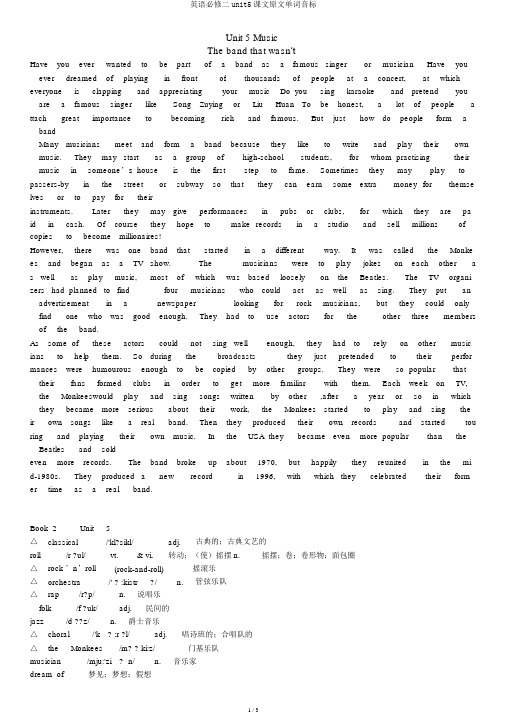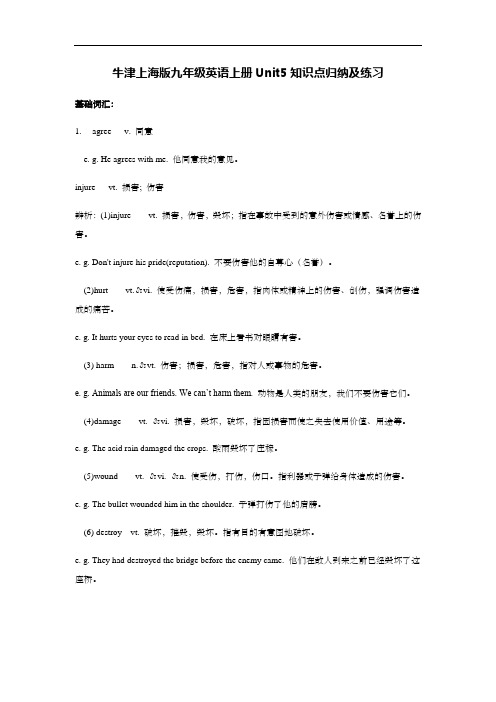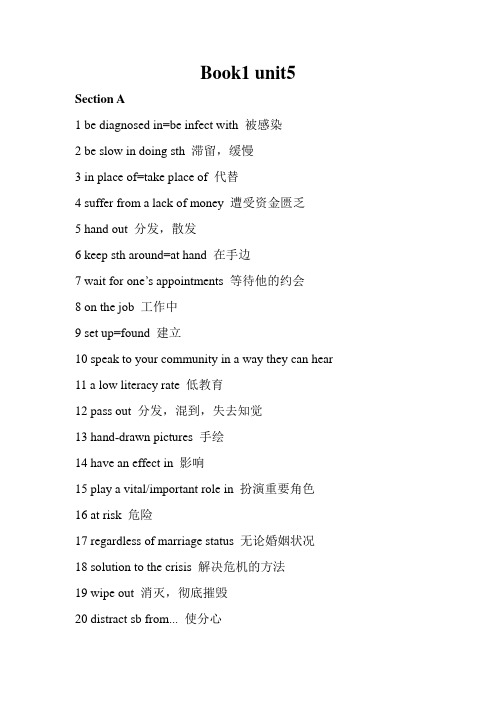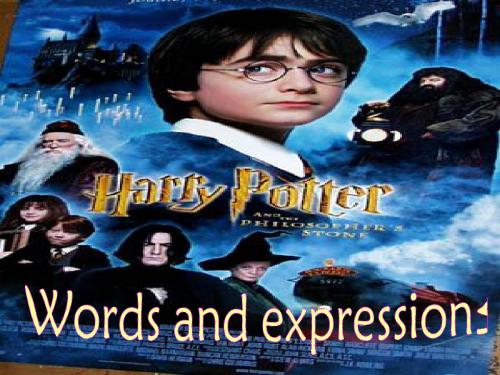unit5words dictation
英语必修二unit5课文原文单词音标

Unit 5 MusicThe band that wasn’tHave you ever wanted to be part of a band as a famous singer or musician Have you ever dreamed of playing in front of thousands of people at a concert,at which everyone is clapping and appreciating your music Do you sing karaoke and pretend you are a famous singer like Song Zuying or Liu Huan To be honest,a lot of people a ttach great importance to becoming rich and famous.But just how do people form a bandMany musicians meet and form a band because they like to write and play their own music.They may start as a group of high-school students,for whom practising their music in someone’s house is the first step to fame.Sometimes they may play to passers-by in the street or subway so that they can earn some extra money for themse lves or to pay for theirter they may give performances in pubs or clubs,for which they are pa id in cash.Of course they hope to make records in a studio and sell millions of copies to become millionaires!However,there was one band that started in a different way.It was called the Monke es and began as a TV show.The musicians were to play jokes on each other a s well as play music,most of which was based loosely on the Beatles.The TV organi zers had planned to find four musicians who could act as well as sing.They put an advertisement in a newspaper looking for rock musicians,but they could only find one who was good enough.They had to use actors for the other three members of the band.As some of these actors could not sing well enough,they had to rely on other music ians to help them.So during the broadcasts they just pretended to their perfor mances were humourous enough to be copied by other groups.They were so popular that their fans formed clubs in order to get more familiar with them.Each week on TV, the Monkeeswould play and sing songs written by other,after a year or so in which they became more serious about their work,the Monkees started to play and sing the ir own songs like a real band.Then they produced their own records and started tou ring and playing their own music.In the USA they became even more popular than the Beatles and soldeven more records.The band broke up about1970,but happily they reunited in the mi d-1980s.They produced a new record in1996,with which they celebrated their form er time as a real band.Book 2Unit5△classical/'kl?sikl/adj.古典的;古典文艺的roll/r ?ul/vt.&vi.转动;(使)摇摆n.摇摆;卷;卷形物;面包圈△rock ’n’roll(rock-and-roll)摇滚乐△orchestra/'? :kistr?/n.管弦乐队△rap/r?p/n.说唱乐folk/f ?uk/adj.民间的jazz/d ??z/n.爵士音乐△choral/'k?:r ?l/adj.唱诗班的;合唱队的△the Monkees/m? ? ki:z/门基乐队musician/mju:'zi?n/n.音乐家dream of梦见;梦想;假想1 / 3△karaoke /k?ri' ?uki/n. 卡拉 OK音;自伴奏音pretend/pri'tend/vt.假装;假扮to be honest在地;attach/ ?'t?t?/vt.&vi.系上;上;附带;接attach⋯to 有(重要性、意);附上;接form/f ?:m/vt.(使)成;形成;组成△fame/feim/n.名誉;名誉passer-by/pa:s?'bai/n.路人;行人earn/ ?:n/vt.;得;得extra/'ekstr?/adj.外的;外加的instrument/'instrum?nt/n.工具;器材;器perform/p ?'f?:m/vt.& vi.表演;执行;行performance/p ?'f?:m?ns/n.表演;演奏pub/p ?b/n.酒;酒吧cash/k? ? /n.金in cash用金;有studio/'stju:di?u/n.工作室;演播室millionaire/milj ?'ne ?/n.百万富豪;富豪play jokes on弄actor/'?kt ?/n.男演;行者rely/ri'lai/vi.依;依赖rely on依;依赖broadcast/'br?:dk ɑ:st/n.广播;播放vi .& vt . (broadcast ; broadcast)广播;播放humorous/'hju:m?r ?s/adj.风趣的;的familiar/f ?'mili ?/adj.熟习的;常的;近的be/get familiar with熟习;与⋯⋯熟习起来or so大break up打坏;分裂;解体△reunite/ri:ju:'nait/vt.再一;再合;重聚attractive/ ?'tr?ktiv/adj.吸引人的;有吸引力的addition/ ?'di?n/n.加;增添;加法in addition此外;也sort out分△excitement/ik'saitm?nt/n.;刺激△ballad/'b?l?d/n.歌;情歌;民△overnight/ ?uv?'nait/adv.在夜晚;在夜里;(口)很快;一夜之dip/dip/vt.浸;蘸△tadpole/'t?dp ?ul/n. 蝌蚪△lily/'lili/n.百合花confident/'k?nfid?nt/adj.自信的;确信的△ Freddy/'fredi/n. 弗雷迪 ( 男名 )brief/bri:f/adj.短的;要的n.纲要;大briefly/'bri:fli/adv.要地;短地devotion/di'v?u? n/n.投入;afterwards/'ɑ:ft ?w?dz/adv.而后;以后invitation/invi'tei? n/n.邀;款待beard/bi?d/n.胡sensitive/'sens?tiv/adj.敏感的;易受害的;敏捷的painful/'peinfl/adj.难过的;痛苦的2 / 3above all最重要;第一3 / 3。
牛津上海版九年级英语上册Unit5知识点归纳及练习

牛津上海版九年级英语上册Unit5知识点归纳及练习基础词汇:1.agree v. 同意e. g. He agrees with me. 他同意我的意见。
injure vt. 损害; 伤害辨析:(1)injure vt. 损害,伤害,毁坏;指在事故中受到的意外伤害或情感、名誉上的伤害。
e. g. Don't injure his pride(reputation). 不要伤害他的自尊心(名誉)。
(2)hurt vt.&vi. 使受伤痛,损害,危害,指肉体或精神上的伤害、创伤,强调伤害造成的痛苦。
e. g. It hurts your eyes to read in bed. 在床上看书对眼睛有害。
(3) harm n.&vt. 伤害;损害,危害,指对人或事物的危害。
e. g. Animals are our friends. We can’t harm them. 动物是人类的朋友,我们不要伤害它们。
(4)damage vt. &vi. 损害,毁坏,破坏,指因损害而使之失去使用价值、用途等。
e. g. The acid rain damaged the crops. 酸雨毁坏了庄稼。
(5)wound vt. &vi. &n. 使受伤,打伤,伤口。
指利器或子弹给身体造成的伤害。
e. g. The bullet wounded him in the shoulder. 子弹打伤了他的肩膀。
(6) destroy vt. 破坏,摧毁,毁坏。
指有目的有意图地破坏。
e. g. They had destroyed the bridge before the enemy came. 他们在敌人到来之前已经毁坏了这座桥。
3. afterward adv. 然后,后来地e. g. We saw the film and afterwards walked home together. 我们看了电影后一起走回了家。
大学英语unit5核心词汇

Book1 unit5 Section A1 be diagnosed in=be infect with 被感染2 be slow in doing sth 滞留,缓慢3 in place of=take place of 代替4 suffer from a lack of money 遭受资金匮乏5 hand out 分发,散发6 keep sth around=at hand 在手边7 wait for one’s appointments 等待他的约会8 on the job 工作中9 set up=found 建立10 speak to your community in a way they can hear11 a low literacy rate 低教育12 pass out 分发,混到,失去知觉13 hand-drawn pictures 手绘14 have an effect in 影响15 play a vital/important role in 扮演重要角色16 at risk 危险17 regardless of marriage status 无论婚姻状况18 solution to the crisis 解决危机的方法19 wipe out 消灭,彻底摧毁20 distract sb from... 使分心21 this is undeclared war 不宣而战22 sign up for 报告参加23 feel comfortable (in) doing sth 感到舒服24 guard against 防止...发生Section B1 thrust sb into the air 把...推向空中2 push off 推迟3 be close to 接近4 lose control 失去控制5 be worried about 担心6 in haste 匆忙7 approach sb 靠近...8 be ahead=take the frist place 领先9 endanger one’s lives 伤害...生命10 natural parents 亲生父母11 call sb names 骂人12 call one’s names 叫...名字13 feel good about myself 自我感觉良好14 prior to the finals 决赛前15 assist sb to do sth 帮助...16 this is an enjoyable triumph 胜利17 HIV-positive18 have a shot at sth 尝试,企图...19 make it 成功20 start with 开始。
高一英语新教材UNIT5(全套含词汇解释及听力录音稿)整理

every night in my dreams i see you,i feel you that is how i know you go on far across the distance and spaces between us you have come to show you go on near...far... wherever you are i believe that the heart does go on once more you open the door and you're here in my heart and my heart will go on and on
Science and fiction film
follow up v.追求 follow-up n.后续 follow suit 遵照先例
accept, receive: 1) 接受 The script was so well-written that the famous actress accepted the role at once. 2) 认可, 同意, 赞成 The murderer accepted the judge’s decision. accept you as a friend. We shall _________ received an invitation to the ball, but I I’ve __________ accept it because I don’t know whether can’t _________ I’ll be able to attend.
Dictation unit 5

Dictation of words from unit 51. proactive [ˌprəʊ'æktɪv]Proactive computers will remind you to do things.2. implicate ['ɪmplɪkeɪt] Who is implicated in the rape of nature?3. recessed [rɪ'sest] Computers are recessed under the desk but are visible through transparent desk tops.4. assorted [ə'sɔːtɪd] At the very least, assorted hard drives will celebrate by crash.5. peripheral [pə'rɪfərəl] IBM showed wearable computer peripherals such as a silver necklace with a hiddenmicrophone.6. mimic ['mɪmɪk]That’s proven far tougher than mimicking regional accent.7. improvise ['ɪmprəvaɪz] It’s that we prefer to improvise.8. sultry ['sʌltri]Computers can now produce very pleasing human voices, complete with Texas drawl orsultry intonations.9. sanguine ['sæŋɡwɪn]There is a sort of sanguine sense.10. hassle ['hæsl]Overburdened teachers also resist the added hassle of bulky and inconvenient hardware.11. assertion [ə'sɜːʃn] I disbelieve the assertion that I could write better with a computer.12. monetary ['mʌnɪtri] The cost would not be just monetary.13. senile ['siːnaɪl]His feats could stun his cyber-senile elder.14. unobtrusive [ˌʌnəb'truːsɪv] There are unobtrusive interfaces for a computer or a phone.15. visionary ['vɪʒənri]It appears that our technological visionaries had visual problems.16. supersede [ˌsuːpə'siːd] What would be superseded would be not only something, but somebody.17. infrastructure ['ɪnfrəstrʌktʃə(r)]Every shop or product will take a new kind of infrastructure.18. turquoise ['tɜːkwɔɪz] The elegant turquoise stone doubles as a nifty scroll-point mouse.19. talk through Future computer programs will probably coach novice ['nɒvɪs] users by talking them through.20. sneak up on The year 2000 won’t sneak up on us, or jump out from behind some Gregorian calendar.。
Unit5vocabulary单词知识点课件牛津深圳版英语九年级上册

点 (九上)
by April
Unit 5
praise n.赞扬;称赞
1. 动词表扬 过去式___p_r_a_i_s_e_d____ 短语 表达赞扬__e_x_p_r_e_ss__p_r_a_is_e__ 因某事赞扬某____p_r_a_is_e__s_b_f_o_r _s_th__ 题 1.He __p_ra_i_s_e_d__ her for her courage.(赞扬) 2.His new movie got high p__r_a_is_e_d
2.Our school football team__b_e_a__t_ the team. (win beat ) 3.Although we _w__a_s__b_e__a_t_e_n_, we must hang on. 4. Have you ever _w_o__n_(赢) a Math competition .
contestant n. 比赛者
❖ 1.复数_c_o_n__te_s_t_s____________ 名词(比赛)_m_a__tc_h____=__g_a_m__e_/_c_o_m__p_e_t_it_i_o_n__
❖ 题 What happened on the stage?-One of the
A. failure B. victory C. successful D. loss
1. 在英格兰
England n. 英格兰
in England
lucky adj. 幸运的
1.lucky (反义词)_______u_n_l_u_c_ky 2.lucky(同义词)_______fo_r_t_u_n_a_te__ 3.lucky(名词)_____l_u_c_k______ 4.lucky(副词)______lu_c_k_i_ly________ =___f_o_r_tu__n_a_te_l_y________________ 短语 今晚的幸运赢家__t_o_n_i_g_h_t_’s__lu_c_k_y__winner 祝你好运 _g__o_o_d_l_u_c_k_t_o__y_o_u
七年级上册Unit5精品PPT课件

小练笔
1) I h_a_v_e____ a tennis ball. __D_o__ you ___h_a_v_e__ a tennis ball?
2) They _h__a_v_e___ a room.
_D_o___ they __h_a_v_e_ a room? 3) Mike _h_a_s____ a basketball.
回答:Yes , he _d_o_e_s__ . / No , he __d_o_e_sn_’_t_ . 2. I have a pen friend.(改为一般疑问句并回答)
__D_o__ you __h_a_v_e_ a pen friend ? No , I ___d_o_n_’_t___ . 3. She has a nice watch.(就划线部分提问) _W__h_a_t__ _d_o_e_s__ she ___h_a_v_e__ ?
easy /'i:zi/ adj. 容易的;不费力的 after /'a:ftə/ prep. 在......以后 class /kla:s/ n. 班级;A课fter class:下课后 classmate /'kla:smeit/ n. 同班同学
deskmate:同桌
Main words and phrases.
提炼总结:
表示谁拥有什么的时候,当主语是第一,二人称和第 三人称复数时,动词用___h_a_v_e____, 当主语是第三人 称单数时,动词用__h_a_s___.
变一般疑问句时,第一,二人称和第三人称复数是在 句首加__D_o____, 第三人称是在句首加_D__oe_s___, do 和 does 后的动词have都使用__原__形_____(形式).
新时代大学英语第三册Unit 5new

(B)
Understand the Short Conversations3A. 源自e was a poor boxer.
B. He is not likely to win, owing to his age.
C. He likes boxing.
D. He will do well again in boxing.
you?
Q: What happened to the man?
(A)
Understand the Short Conversations
A. They are going to see Jim.
8
B. They are going to do exercise.
C. They are going to have dinner.
M: It’s a shame that you didn’t win your tennis match.
W: I might have won if I’d listened to my coach.
Q: What does the woman imply?
(B)
Understand the Short Conversations
do you?
W: You must be joking. My sister is one of the star
players.
Q: What will the woman do?
(D)
Listen and Understand
Task 1
Directions: In this section, you are going to hear a short passage. At the end of the passage, you will hear some questions. Both the passage and the questions will be spoken only once. After you hear a question, you must choose the best answer from the four choices marked A, B, C and D.
- 1、下载文档前请自行甄别文档内容的完整性,平台不提供额外的编辑、内容补充、找答案等附加服务。
- 2、"仅部分预览"的文档,不可在线预览部分如存在完整性等问题,可反馈申请退款(可完整预览的文档不适用该条件!)。
- 3、如文档侵犯您的权益,请联系客服反馈,我们会尽快为您处理(人工客服工作时间:9:00-18:30)。
These remarks are not representative of new ideas, honest emotions, or considered thought. Like a piece of bread, they are only the 17.c____ of the interaction, or what is said from the polite distance of social contexts: greetings, farewells, convenient excuses, and the like. This generalization, therefore, is not a true 18.c_____ of Chinese culture but only a stereotype of our 19.e_____ behavior.
Could this be why the Chinese friends of my parents' generation are willing to accept the generalization? "Why are you complaining?" one of them said to me. "If people think we are modest and polite, let them think that. Wouldn't Americans appreciate such an 14.h______ description?" And I do believe that anyone would take the description as a compliment — at first. But after a while, it annoys, as if the only things that people heard one say were what had been filtered through the 15.s___ of social 16.n_____: I'm so pleased to meet you. I've heard many wonderful
Having listened to both Chinese and English, I'm suspicious of comparisons between the two languages, as I notice the 1.r_______ challenges they each present. English speakers say Chinese is extremely difficult because different words can be 2.d________ by very subtle variations in tone. English is often 3.b_____ with the label of 4.i_______, a language of too many broken rules.
Even more dangerous, in my view, is the temptation to view the 5.g___ between different languages and behavior in translation. To listen to my mother speak English, an outside 6.s______ might make the 7.d______ that she has no concept of the 8.t______ differences of past and future or that she is gender blind because she refers to my husband as "she". If one were not carefulall Chinese people take an indirect route to get to the point. It is, rather, my mother's individual tendency to 9.o______ her language and wander around a bit.
"So how does one say 'yes' and 'no' in Chinese?" my friends may ask carefully. At this 20.j_____, I do agree in part with The New York Times Magazine article. There is no one word for "yes" or "no", but not out of necessity to be discreet. If anything, I would say the Chinese equivalent of answering "yes" or "no" is specific to what is asked.
I worry that the dominant society may see Chinese people from a limited perspective, 10.h______ us in with the stereotype. I worry that the seemingly innocent stereotype may lead to actual 11.i_______ and be part of the reason why there are few Chinese in top management positions, or in the main 12.j______ or political sectors. I worry about the power of language: If one says anything enough times, it might become true, with or without 13.m_______ intent.
1.reciprocal 2.denoted 3.bracketed 4.inconsistency 5.gulf 6.spectator 7.deduction 8.temporal 9.ornament 10.hedge
11.intolerance 12.judiciary 13.malicious 14.honorary 15.sieve 16.niceties 17.crust posite 19.exterior 20.junction
